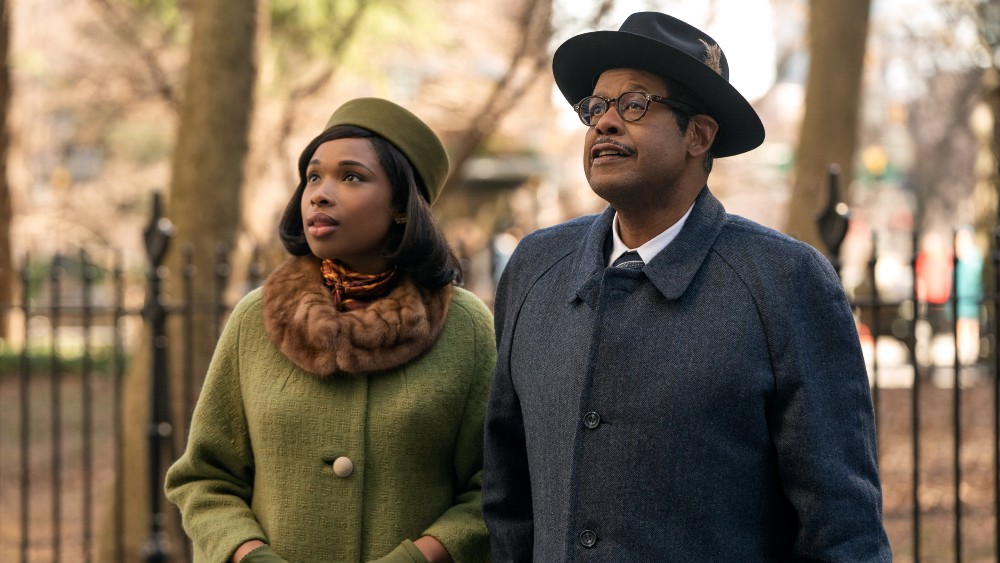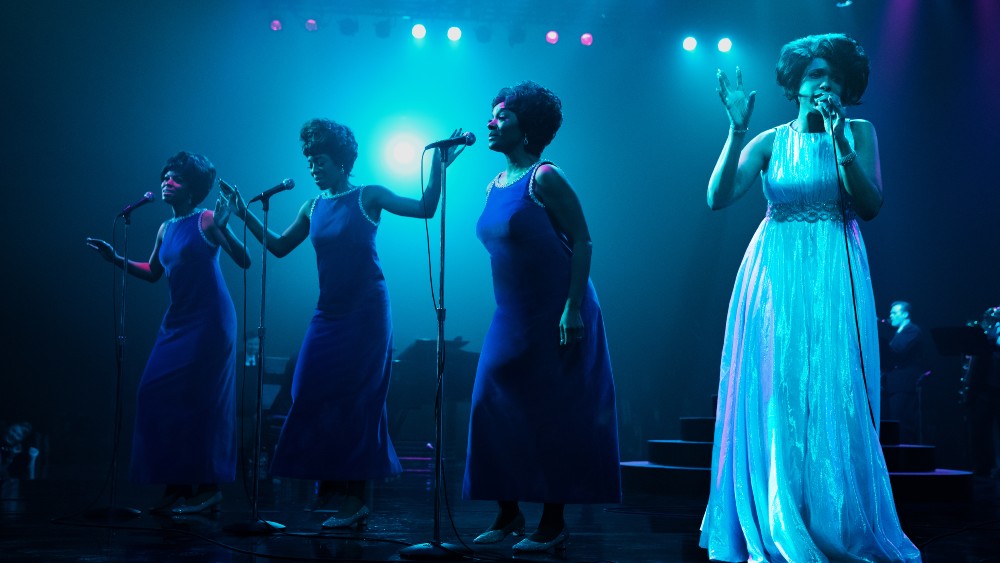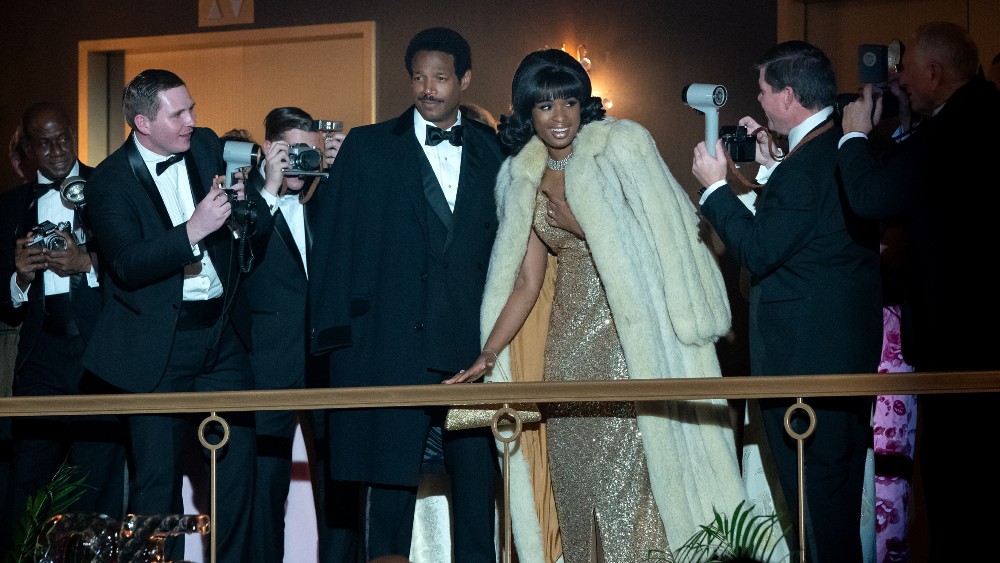
Playing royalty of any kind on screen is tough, but for Jennifer Hudson’s latest performance as Aretha Franklin, known as “The Queen of Soul,” in Respect, the biopic about Franklin’s life, the challenge is arguably tougher. Franklin’s distinctive, bone-chilling voice has been called unequaled, and the task of nailing those tunes is not one to envy, even in the hands of the supremely talented, Oscar-winning actress. Surprisingly, though, Hudson holds her own and ends up being the best part of an otherwise tepid film by first-time filmmaker Liesl Tommy. Hudson looks and sounds nothing like Franklin, but she imbues the character with enough of her characteristic passion, and, by doing so, channels what was perhaps the Queen’s most important trait other than her distinctive voice.
Respect opens, shows, and closes, almost in paints-by-number style, like nearly every single biography of a musical legend you have seen before. The young Aretha has inspiration, talent, and some family trauma. Her older self struggles to find success, until she doesn’t, at which point she struggles to keep her sanity (and sobriety). Eventually, she mostly does, propelling her to even greater stardom and, therefore, to the subject of a screenplay by Tracey Scott Wilson and an on-screen depiction by Hudson alongside her talented cohorts.

The film sprinkles interesting and even disturbing tidbits, some perhaps unknown to all but the most hardcore Aretha fans. When she was young, her father C.L. (Forest Whittaker), a legendary Baptist minister in Detroit during the 1950s, threw opulent salons at which a ten-year-old Aretha (Skye Dakota Turner) first showed off her pipes. The soirées featured the musical likes of Ella Fitzgerald and Duke Wellington, as well as the important presence of the Rev. Martin Luther King, Jr., who becomes an influential figure in Aretha’s life. This opening act introduces us to Aretha’s mother Barbara (Audra McDonald), who is a pivotal figure in her youth, to at least one troubling episode when Aretha was a little girl, and to the siblings and grandmother who would eventually stay close to her life and heart.
When Hudson takes over, some of Respect’s more interesting morsels include Aretha’s life as a civil rights activist, the terrible abuse at the hands of her first husband Ted White (Marlon Wayans), and her serious struggles to find fame at a time when Jazz, Blues, R&B, and Soul were on a transitory collision course with history. Eventually, of course, she finds her stride—and the songs that any person who lives on this planet will instinctively recognize—and the movie reverts to the style that mostly defines it, a carbon copy of all other musical biopics before it, and, likely, most of those after it.

But Tommy also treats us to one of the film’s two strongest element (the first being Hudson’s performance), which is its technical dedication and marvel. The impressive outerwear, by up and coming Broadway designer Clint Ramos, are perhaps the most satisfying of them all. Ramos deftly navigates the subtle but important fashion shifts from the day the movie begins in 1952 to the day it ends sometime in the late 70s, by infusing each thread with both disarming familiarity and subtle originality. He rightfully keeps Hudson as Franklin at the center of the proceedings, but effectively uses similar colors, threads, and patterns for when Aretha and her sisters (the principal backup vocalists) must make Diva walks together, and never neglects the voice of the various suits worn by the men, including by Franklin’s long-time agent Jerry Wexler (Marc Maron).
The makeup and hairstyling by Stevie Martin is also noteworthy, particularly as he is given the unenviable task of emulating Ms. Franklin’s many, iconic hairdos, and placing them on an actress who looks little to nothing like the person she is portraying. The most stunning of Martin’s work comes during a scene when Franklin is shown disheveled, with no wigs or extensions, but instead sporting stringy, unmade hair that delivers a guttural punch of sympathy for the depths of the low that Franklin plummets to in that pivotal scene.
Perhaps less impressive is the heavy-handed (if well-executed) work by Cinematographer Kramer Morgenthau, who tries to keep you on your feet by toggling between regular lighting to grainy, documentary-style footage, to black and white shots, all meant, perhaps, to signal that original footage of the events in question survives. But this fact, that is both obvious and irrelevant, ultimately overplays the obvious purpose of trying to provide variety to the proceedings and devolves into being distracting.

At the risk of saving the best for last, however, most accolades belong to Ms. Hudson herself, who delivers a career-best performance since her Dreamgirls, storm-the-castle type debut. At the most fundamental level, it is simply a delight to listen to the talented singer’s interpretation of bits and pieces of some of Franklin’s most iconic (and also the lesser known) hits. But Ms. Hudson adds additional layers of nuance to her performance, from a softer but singularly affected tone of voice for the young adult Franklin, to the more commanding but at times cracking demeanor of the middle-aged version of the singer. Ms. Hudson has experience, of course, in portraying a troubled or misunderstood singer whose passion, dedication, and hurt — demons, as Franklin repeatedly refers to them as — burst out through each word of each lyric, through each wave of each tune. The fact that she has been here before is to her and our benefit, because in Respect — unlike in Dreamgirls — Hudson understands that suffering is important in a film of this genre not just for suffering’s sake, but to keep the viewer caring about the character. This is a task Hudson singlehandedly carries, despite being weighed down by the stale script her character inhabits.
By the time the credits roll, you will be left with a sense of wonderment at the talent of most of the cast and crew behind Respect, if not necessarily of the woman it portrays. Perhaps no movie can do her justice. Perhaps the story is too sanitized, too bereft of risk, true danger, or anything even close to original to achieve greatness. Sensing all this, Tommy does what most newer directors would do to fill in the gaps—write it all out in a coda. But, in paying homage to Aretha with the end titles, Tommy does a tremendous disservice to her own film. At that point, we find out about Aretha’s litany of stunning accolades, including Kennedy Center honors, the Presidential Medal of Freedom, and others. All this does is make it plainer that this woman was one like no other—and that the movie portraying her life is not.
Grade: B
Respect is now playing in movie theaters nationwide. All photos courtesy MGM.





